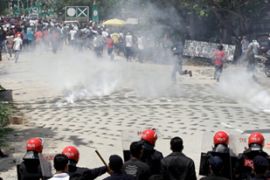As voting got under way police fired tear gas to disperse a crowd of 300 opposition supporters at a poll-related incident in northeastern Terengganu state.
Twenty-two people were arrested after throwing stones at busses, allegedly carrying people they feared would cast bogus votes.
Opposition protests
Supporters of Pan-Malaysian Islamic Party (PAS) stopped several buses and cars which they suspected were transporting supporters of the ruling National Front coalition pretending to be voters from the district.
Musa Hassan, a local police chief, told a news conference: “The PAS supporters threw stones at police vehicles, forcing the police to release tear gas to control the situation.”
Large crowds had flocked to opposition rallies during the campaign, especially ethnic Chinese and Indian voters unhappy with the BN government, dominated by politicians from the Muslim majority of ethnic Malays.
Opposition parties are hoping to deny the coalition a two-thirds majority that enables the government to make changes to the constitution without parliamentary debate.
Badawi’s warning
Abdullah Ahmad Badawi, the Malaysian prime minister, told voters the night before the elections that they could cause instability and chaos if they abandoned BN, implying that racial tensions could flare up.
In 1969, after Barisan suffered a major electoral setback, race riots broke out in which hundreds of people were killed and a two-year state of emergency followed.
Badawi said: “You have to vote for our future. You have to vote for our children… What will happen if there is chaos and there is instability?”
Experts say Badawi’s continued leadership could be in jeopardy if his majority falls back below 80 per cent, or around 178 seats in the new 222-seat parliament.
The election, which will also decide the make-up of state assemblies, has been tainted by allegations of vote-rigging.
After casting his vote on Saturday, Nik Aziz Nik Mat, the leader of the main opposition Islamist party, said his supporters had found a member of the main ruling party in possession of 28 identity cards for use in electoral fraud.
Nik Mat’s Parti Islam se-Malaysia (PAS) controls northeast Kelantan state, the only opposition-held state, and faces a major campaign by BN to win it back after 18 years of PAS rule.
Malaysia’s electoral commission had widely advertised the planned use of the special ink – applied to a voter’s fingernail after casting their ballot – as its response to long-standing allegations of vote-rigging.
‘Phantom’ voting
The decision to scrap the plan drew a warning from Bersih, a loosely aligned group of civil society organisations and political parties, that “phantom” voting would be made easier and that these would be the “dirtiest elections ever”.
Last November, Bersih led thousands of people on to the streets of Kuala Lumpur, Malaysia’s largest city, demanding electoral reforms.
That protest was put down by riot police with tear gas and chemical-laced water cannon.
Another rally two weeks later by thousands of ethnic Indians protesting against discrimination drew a similar police response.
Electoral flaws
Tricia Yeoh from the Centre for Public Policy Studies told Al Jazeera that this election is going to be drastically different to the last.
“There has been, in the past four years, an increasing disquiet in almost all sectors of society,” she said.
“This is due to a number of reasons…the failure of the administration to curb corruption [AND] the growing income disparity between different societies in Malaysia.”
Yeoh said the electoral system is in need of reform because of conditions that are unfavourble towards the opposition.
“There is media bias. You have gerrymandering, non-transparent administration procedures,” she said.

